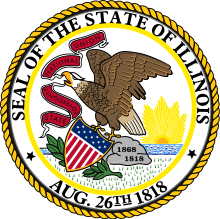William B. McKinley (Illinois state legislator)
William B. McKinley (June 1, 1879 – August 12, 1964) was an American lawyer and politician.
Born in Postville, Iowa, McKinley went to the University of Northern Iowa. He was a school principal in Iowa. McKinley moved to Chicago, Illinois and received his law degree from Chicago-Kent College of Law in 1907. He practiced law in Chicago, Illinois. In 1913, McKinley served in the Illinois House of Representatives and was a Democrat. He served as speaker of the house and was a compromise candidate of the various Democratic factions.[1][2]
As speaker, McKinley played a key role in the passage of the law granting Illinois women municipal and presidential suffrage, which was enacted on June 26, 1913. After being lobbied by both proponents and opponents of the cause, McKinley moved the bill to a legislative vote, the first time such a bill had gone to vote in the state legislature.[3] According to the Rockford Republican, "McKinley’s fiancée had refused to formalize their engagement until the suffrage bill passed."[4] The act made Illinois the first state east of the Mississippi River to give women the right to vote for President.[5]
Notes
- 'American Legislative Leaders in the Midwest, 1911-1994,' Nancy Weatherly Sharp and James Roger Sharp, editors, Greenwood Press, Westport, Connecticut: 1997, Biographical Sketch of William B. McMinkey, pg. 171
- 'Illinois Blue Book 1913-1914, Biographical Sketch of William B. McKinley, pg. 300
- McConnaughy, Corrine M. (2013-10-14). The Woman Suffrage Movement in America: A Reassessment. Cambridge University Press. p. 152. ISBN 9781107433960.
- "Flashback Springfield: Women get (limited) right to vote". The State Journal-Register. Retrieved 2019-08-03.
- Trout, Grace Wilbur (1920). "Side Lights on Illinois Suffrage History". Journal of the Illinois State Historical Society. 13 (2): 152. ISSN 0019-2287. JSTOR 40194491.
